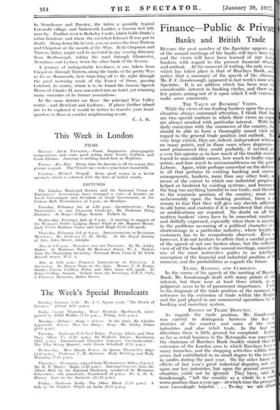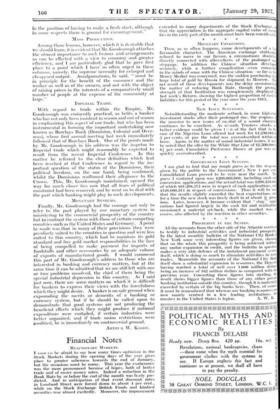Finance—Public & Privat
Banks and British Trade
BEFORE the next number of the Spectator appears of the annual meetings of the banks will have been he and the views will have been le-arned of our lead' bankers with regard to the present financial- situati and outlook. At the moment of writing, the only meet which has taken place is that of Barclays Bank, and notice that a summary of the speech of the chain' Mr. F. C. Goodenough, appeared in last week's issue of t Spectator. It is an address which has been read Si considerable interest in banking circles, and there are few points arising out of it upon which I will venture make some comments.
THE VALUE OF BANKERS' VIEWS.
While the views of our leading bankers upon the gene situation always command attention, I think that t are two special matters in which their views as expe are always awaited with particular interest. - With tI daily connexion with the commerce of the country, the should be able to form a thoroughly sound view in regard to the general trade 'position and 'outlook. To very large extent, they are, indeed, independent wanes on many points, and in those cases where depression most pronounced they could probably, if invited, gi a very fair opinion as to how much of the trouble must traced to unavoidable causes, how much to faulty orga nation, and how much to unreasonableness on the part Labour. Again, while perhaps somewhat on the defensi in all that pertains to existing banking and curren arrangements, bankers, more than any other body, aware of the extent to which our industrial progress helped or hindered by existing systems;- and. because the long run anything harmful to our trade, and therefor to the economic position of the country,- must read unfavourably upon the banking poSition, there is reason to fear that they will give any slavish adheres to old forms and customs if it is considered that chap or modifications are required. No doubt on all th matters bankers' views have to be somewhat cautiouil and skilfully expressed, especially when there is anyth in the problems savouring of a political character or shorteomingS in a particular industry, where loyalty t customers has to be scrupulously observed. Even however, I do not hesitate to affirm that a careful peen of the speech of not one banker alone, but the 'collecti view of all the bankers at the annual -meetings, constant one of the most instructive guides to an intelligen conception of the financial and industrial position at t moment, and the probabilities as regardi the future.
TRADE, BANKING AND CURRENCY.
In the course of his speech at the meeting of Bards Bank, Mr. Goodenough dealt with Many paints of vit interest, but there were at least three which, in In judgment, seem to be of paramount importance. I ref to his diagnosis of the trade position at the moment, Ins reference to the extension of trade within the Empire, and the part played in our commercial operations by th banking and monetary system.
EFFECT OF TRADE. DISPUTES: As regards the trade position, Mr. GoodCnul.- was careful to distinguish between the key ill' dustries of the country and some of the nett industries and also retail trade. In the last ho directions there is little ground for complaint. Indeed. so far as retail business in the Metropolis was concerned. the chairman of Barclays Bank frankly .stated „that tht extension of the London area in which Barclays have"' many branches, and the shopping activities within tho' areas, had_contributed in no small- degree to the uncutse in profits during the past, year. On the other hand, tk effects of last year's great industrial disputes, not old! upon our k6- industries,lAit upon the- gineral • econonii situation, could not be iiliored. They have, said Mt. GOodenough, " left 'the country as a -whole —in a Miceli worse position than a year ago---t which time the prospects were exceedingly hopeful. '. To,.day. 'We 'are almost in the position of having to make a fresh start, although in some respects there is ground for encouragement."
MASS PRODUCTION.
Among those lessons, however, which it is desirable that we should learn, it is evident that Mr. Goodenough attaches the utmost importance to such fusions and arrangements as can be effected with a view to economy and greater efficiency, and I am particularly glad that he gave first place to a point which I have so often urged in these columns, namely, the supreme necessity for enlarged and cheapened output. Amalgamations, he said, " must be in principle for the benefit of the consumer and the worker as well as of the owners, and not with the object of raising prices in the interests of a comparatively- small number of people at the expense of the community at large."
IMPERIAL TRADE.
With regard to trade within the Empire, Mr. Goodenough was eminently practical,. as befits a banker who has not only been insistent in season and out of season in emphasizing this aspect of our trade, but who has been instrumental in forming the important undertaking now known as Barclays Bank (Dominion, Colonial and Over- seas), whose first annual meeting last week immediately followed that of Barclays Bank. One of the points made by Mr. Goodenough in his address was the impetus to Imperial trade which might reasonably be expected to result front the recent Imperial Conference. In this matter he referred to the clear definition which had been reached at that Conference in regard to the im- portant question of the status of the Dominions, their political freedom, on the one hand, being confirmed, whilst the Dominions reaffirmed their allegiance to the Crown. This, Mr. Goodenough maintained, opened the way for much closer ties now that all fears of political constraint had been removed, and he went on to deal with the part which banking might play in such developments.
MONETARY SYSTEMS.
Finally, Mr. Goodenough had the courage not only to refer to the part played by our monetary system in ministering to the commercial prosperity of the country but.to contrast the system with those of certain competing countries such as the United States and Germany. A point he made was, that in many of their provisions they were peculiarly suited to the countries in question and were less suited to this country, which had to maintain its gold standard and free gold market responsibilities in the face of being compelled to make payment for imports of foodstuffs and other necessaries by an adequate volume of exports of manufactured goods. I would commend this part of Mr. Goodenough's address to those who are interested in banking and currency matters, but at the same time it can be admitted that we are still left with one or two probleins unsolved, the chief of theM being the special industrial depression in this country. As I said just now, there are some matters on which it is difficUlt for hankers to express their views with the forcefulness which they might desire. A banker is on safe ground when expounding the merits or demerits of a banking or currency system, but if he should be called upon to demonstrate that good systems are not producing the beneficial effects which they might produce if national expenditure were curtailed, if certain industries were better organized, and if trade union restrictions were modified, he is immediately on controversial ground.
ARTHUR W. KIDDY.







































 Previous page
Previous page